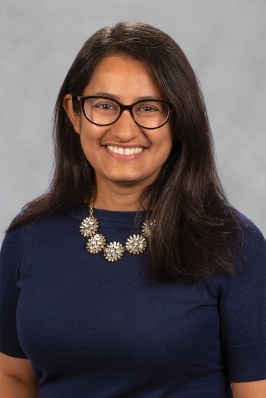Mentoring the Next Generation in Blood Cancer Research
Dr. Mikkael Sekeres and his mentees discuss how mentorship helps reveal the challenges facing the next generation and builds an ever-expanding support network.

After graduating from medical school and completing her residency and fellowships in hematology and oncology, Sangeetha Venugopal, M.D., M.S., looked for the perfect place to start her career as an academic leukemia physician. With a stellar résumé and several research papers under her belt, she had a wide range of options.
Dr. Venugopal made her decision by consulting with the mentors who guided her throughout her studies. They collectively zeroed in on one suggestion: choose the institution with the best mentor for her skills and goals. That led her to the University of Miami’s Miller School of Medicine, where she’s now an assistant professor of clinical medicine.
“The reason I chose Miami is because Dr. Sekeres is here,” she said, referring to Mikkael Sekeres, M.D., M.S., chief of the Division of Hematology at the Sylvester Comprehensive Cancer Center and her mentor for the past year. “A mentor is someone who always has your back and guides you in the maze of career development. They advise you through life and help you make informed choices to move your career forward. Every single thing — I go to Dr. Sekeres. He’s been a phenomenal mentor and friend.”
Career Guidance

Drs. Sekeres and Venugopal meet once a month and communicate regularly about patient care, research endeavors and career advancement. That dynamic embodies the mentor-mentee relationship, which helps younger cancer researchers improve, helps mentors understand the challenges facing the next generation and builds an ever-expanding support network for both.
Namrata S. Chandhok, M.D., an assistant professor of medicine at the Miller School, is another of Dr. Sekeres’ mentees. Dr. Chandhok said Dr. Sekeres provides opportunities, helps structure her research ideas, and offers the tools and connections needed to effectively execute those ideas. For example, she is passionate about improving the visibility of underrepresented populations in clinical cancer research, so Dr. Sekeres recommended her for a committee at the American Society of Hematology that advocates for better inclusion. He will also serve as her mentor for the Robert A. Winn Diversity in Clinical Trials Career Development Award, a grant focused on improving diversity and inclusion initiatives in clinical research.
“We all have great ideas, but the system can be a little opaque, so how do you get from point A to point B?” Dr. Chandhok said. “As a world-renowned expert and experienced researcher, [Dr. Sekeres] is intimately attuned to the needs of junior faculty and trainees and helping them reach their highest potential.”
Leadership Legacy

Dr. Sekeres says he feels embarrassed taking any credit for the work produced by Drs. Chandhok and Venugopal, who he describes as brilliant, “natural-born scientists.” But he also understands the value of his role, having served as a mentor to about 20 young doctors in his career. He does that, he said, because he received the same kind of mentorship early in his career.
As a student at the Perelman School of Medicine at the University of Pennsylvania, Dr. Sekeres was mentored by Brian Strom, M.D., M.P.H., then the chair of the Center for Clinical Epidemiology and Biostatistics at the University of Pennsylvania. Dr. Sekeres credits Dr. Strom with teaching him two core concepts that have remained at the heart of his mission: always focus research on improving the lives of patients above all else, and respect what your mentees can teach you. Dr. Sekeres later led a research project that found that doctors no longer needed to treat a diagnosis of acute leukemia in older adults as a medical emergency, giving them more time to explore treatment possibilities. He also assisted in a research project that led to faster antibiotic treatment of patients with a suppressed immune system presenting to the emergency room, which in turn shortened their hospital stay.
“It was Dr. Strom’s mentorship that made research like that possible,” Dr. Sekeres said. Dr. Strom went on to become the chancellor of Rutgers Biomedical and Health Sciences.
Drs. Chandhok and Venugopal both say they plan on becoming mentors themselves when they reach that point in their careers, completing what they consider the full circle of the mentor-mentee dynamic.
“I have had phenomenal mentors and they have helped me through every step of my career,” Dr. Venugopal said. “If I could return even a quarter of it, that would be great.”
Tags: blood cancers, cancer research, Dr. Mikkael Sekeres, Dr. Namrata Chandhok, Dr. Sangeetha Venugopal, Sylvester Comprehensive Cancer Center


